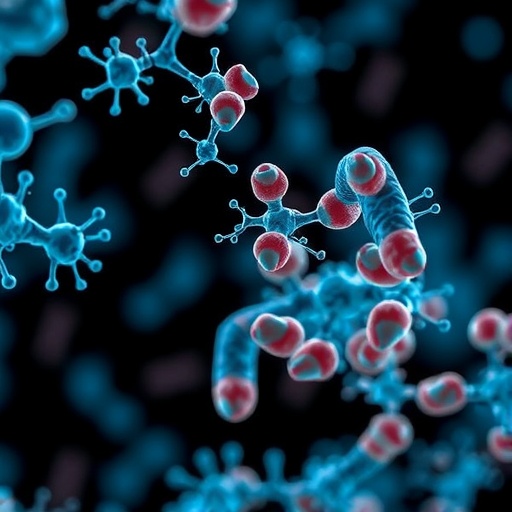A groundbreaking study conducted by researchers at the Technical University of Munich (TUM) unveils a novel cellular mechanism linking chronic cellular stress in intestinal cells to alterations in the gut microbiome that favor cancer-promoting bacteria. This work, recently published in Nature Metabolism, sheds critical light on how sustained activation of a specific protective protein, ATF6, disrupts lipid metabolism and drives a microbial imbalance conducive to tumor development. These discoveries provide an unprecedented window into complex host-microbe interactions and open avenues for targeted cancer prevention and therapy.
The gut microbiome’s intricate influence on human health has been acknowledged over recent decades, yet the exact molecular events modulating its composition remain elusive. In this study, the TUM team, led by Professor Dirk Haller and Dr. Olivia Coleman, identified that under normal conditions, the transcription factor ATF6 remains dormant in intestinal epithelial cells. ATF6’s canonical role involves detecting misfolded or excessive defective proteins within the endoplasmic reticulum, thereby triggering cellular repair mechanisms or proteolytic clearance to maintain homeostasis. However, chronic activation of ATF6, as observed in certain pathological states, can have unintended consequences on cellular metabolism and microbial ecology.
Probing deeper into this phenomenon, the researchers demonstrated that persistent ATF6 activation in intestinal cells leads to a significant rewiring of lipid metabolic pathways, particularly augmenting the synthesis of long-chain fatty acids. These lipid metabolites, typically involved in membrane structure and signaling, become aberrantly abundant and serve as preferential nutrient sources for specific bacterial taxa within the gut. Chief among these is Desulfovibrio fairfieldensis, a sulfate-reducing bacterium recognized for its deleterious potential when overrepresented.
The proliferation of D. fairfieldensis instigated by excess long-chain fatty acids marks a critical shift in microbial community composition, tipping the ecological balance toward a pro-carcinogenic microbiome. Intriguingly, these bacteria excrete hydrogen sulfide, a gaseous metabolite known to induce DNA damage and inflammation at elevated concentrations, thereby fostering an environment conducive to malignant transformation of the intestinal epithelium. This mechanistic link bridges cellular metabolic dysregulation with microbiome-driven oncogenesis in a direct and compelling manner.
To validate their findings, the team employed sophisticated experimental models including three-dimensional intestinal organoids and genetically modified mice. Organoids, miniature replicas of the gut epithelium grown ex vivo, enabled precise dissection of cell-intrinsic changes in response to ATF6 activation. In vivo, mice engineered to constitutively activate ATF6 in their intestinal cells developed cancer only when harboring an intact microbiome. Contrastingly, germ-free mice devoid of microbiota did not develop tumors despite persistent ATF6 signaling, underscoring the microbiome’s indispensable role in tumorigenesis under these conditions.
Further, pharmacological interventions targeting lipid metabolism effectively disrupted this pathological cascade. When lipid synthesis inhibitors were administered to ATF6-activated mice with microbiomes, the excessive production of long-chain fatty acids was curtailed, preventing the overgrowth of harmful bacteria and, consequently, cancer formation. These results highlight a promising therapeutic angle focusing on metabolic modulation to reshape microbial communities and mitigate cancer risk.
The translational relevance of these rodent models was addressed by analyzing clinical datasets comprising over 1,000 cancer patients. Notably, chronic ATF6 activation was detected in up to 38 percent of individuals above 50 years, a demographic prone to intestinal neoplasia. Parallel metabolomic profiling revealed a congruent increase in long-chain fatty acids within human tumor tissues, mirroring the metabolic signature observed in murine models. This cross-species concordance bolsters the hypothesis that ATF6-mediated lipid alterations and resultant microbiome remodeling represent conserved mechanisms in human intestinal carcinogenesis.
Despite the compelling nature of these findings, the authors caution against premature clinical application of microbiota-based therapies, such as probiotics or targeted microbial suppressants. Professor Haller emphasizes that additional research is required to elucidate the influence of dietary components on ATF6 activation and long-chain fatty acid production, as well as to explore if chronic ATF6 signaling contributes to cancers beyond the gut. Such insights will be vital for developing targeted interventions with demonstrable efficacy and safety.
Beyond its implications in oncology, this research also deepens our appreciation of the endoplasmic reticulum stress response and its far-reaching impact on host-microbe homeostasis. The paradigm established here—that intracellular stress sensors not only govern cell fate but also orchestrate extracellular ecological dynamics—may have ramifications in numerous chronic diseases where dysbiosis and metabolic dysfunction intersect.
This study exemplifies the power of integrated approaches utilizing cutting-edge organoid technology, mouse genetics, and human clinical data to unravel complex biological networks. By illuminating the molecular circuitry through which cellular stress reshapes the microbiome landscape, it opens novel paths for diagnostics and therapeutic innovation in gastrointestinal health and disease.
In conclusion, the chronic activation of ATF6 emerges as a pivotal driver that reprograms intestinal lipid metabolism, fueling the expansion of cancer-promoting sulfate-reducing bacteria. This axis represents a tangible link between cellular dysfunction and microbial ecology, with profound implications for understanding and potentially interrupting intestinal carcinogenesis. As research continues, targeting metabolic pathways and microbial constituents together offers a formidable strategy to intercept cancer development at its roots.
Subject of Research: Animals
Article Title: (Not provided)
Web References: http://dx.doi.org/10.1038/s42255-025-01350-6
References: Haller D., Coleman O. et al. (2025). Nature Metabolism.
Image Credits: Astrid Eckert / Technical University of Munich (TUM)
Keywords: ATF6, gut microbiome, lipid metabolism, long-chain fatty acids, Desulfovibrio fairfieldensis, intestinal organoids, hydrogen sulfide, cancer microbiome, endoplasmic reticulum stress, intestinal carcinogenesis, microbial dysbiosis, metabolic reprogramming




